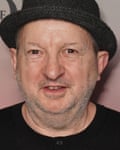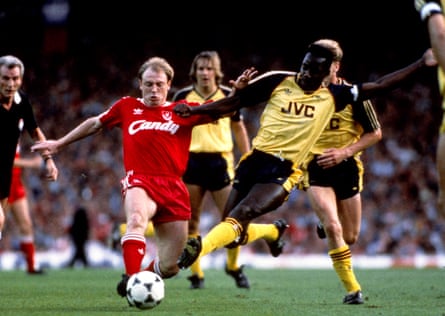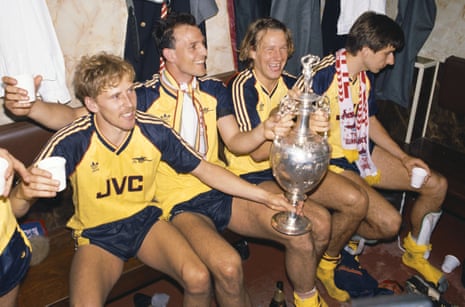I started having piano lessons aged six in 1966. The year the England men’s football team won the World Cup. It’s a fanciful notion, but maybe these two significant events in my life were for ever entwined. My family were not football fans, so I tended to flit from one team to another. I was promiscuous with my loyalty. Usually, whoever was top of the league that season. So ironically, I liked Liverpool for a while. Never Tottenham, I’m proud to say. I hated practising the piano, yet by the age of nine my music obsession took hold. I used to improvise around the little piano pieces I had to learn and that’s how I started composing. Before then, I thought I was going to be a professional footballer. The trouble is, I was hopeless. I had zero ability. At some point I realised all of my mates were better than me. So music took over. Well, at least composers, unlike footballers, don’t have to retire at 35. In fact, I thought then that being old was a positive advantage.

During my teens my obsession with football waned, and I have a big knowledge gap from the mid-70s to mid-80s. I am at a loss in a pub quiz if I get questions about Don Revie’s Leeds United or which year did Ipswich win the FA Cup? But in the mid-80s I moved to a home that was within a mile of the hallowed Highbury stadium in north London, then home to the Arsenal (as they are known). From my rented top-floor flat in Highbury Fields (in fact, five doors down from the home of the eminent conductor Colin Davis, who I never met) I could hear the siren call of Arsenal supporters singing. Lured by these distant voices, I just had to go and see a game. My first match was a drab League Cup game, I’ve forgotten who against. So I don’t have that sentimental memory that most fans have of always remembering their first match, but the atmosphere was intoxicating. I was hooked.
Following football at that time was a hobby that was frowned upon. You didn’t talk about it in polite circles. So the idea that it would end up featuring in my compositions was rather unlikely. My sense was that the musical establishment wouldn’t have liked it. The protagonist in my first opera, Greek (1988), is a football hooligan. Racist, violent, foul-mouthed. I’ve met plenty of them over the years. It did mean I could incorporate some of the songs and rhythms I had heard on the terraces at Arsenal. In the early 90s, I moved to Gillespie Road opposite the Golden Fish Bar, even closer to the old stadium – a literal stone’s throw from it now.

One of the first pieces I wrote while living there was Momentum. I’d just started a job as composer in association at the City of Birmingham Symphony Orchestra with Simon Rattle, and this was commissioned to be performed for the concert to commemorate the opening of Symphony Hall in Birmingham in 1991. A lot of the players in the orchestra were football fans. There was a Leeds fan in the trumpets, Aston Villa and Birmingham fans dotted around the sections, and an Arsenal fan in the clarinets. My great mate Jon Carnac, freelancing with them at the time, even wore his Arsenal replica kit to rehearsals of my orchestral piece Three Screaming Popes, premiered by the CBSO a couple of years earlier. So I thought it would be fun to incorporate in Momentum the famous “Olé olé olé olé” chant as a tribute to fans among the CBSO players. It was a sort of daft in-joke.
I’ve since quoted many football chants and rhythms in compositions, most extensively in my first world war opera The Silver Tassie where Harry, the tragic hero, is a skilled footballer who is severely injured at the front. I moved away from the Arsenal ground area but I still avidly watch matches although I no longer go into a bout of depression every time they lose, which is quite a lot these days. I’ve grown up a bit.
But I have never written a work specifically about football. So it is so exciting that the Barbican in London has commissioned me to write a piece for live orchestra to accompany a film of highlights of the iconic 1989 match between Arsenal and Liverpool. Its head of music, Huw Humphreys, had this idea of showing a film of a famous football match, which dramatically settled the league title, with live orchestral accompaniment. He turned to me – I suppose as I had form. That match was unique because the ultimate prize being contested was between the league’s top two teams in what was also the final match of the season. This had never happened before, and hasn’t happened since. The match was to be played a month earlier but had been postponed because of the Hillsborough disaster. Arsenal had the improbable task of needing to beat Liverpool by two clear goals to win the First Division – as the top flight was called before the creation of the Premier League in 1992.

Arsenal were written off by everyone, press, pundits, anyone who had an opinion. I didn’t have a ticket so I watched it at home. When the winning goal went in there was pandemonium in the streets around us. It was one of the most exhilarating nights of my life.
Everyone likes the triumph of an underdog and my work is more my emotional reaction to that day rather than a film score. It’s foreground not background music. It’s over the top and in your face. Scored for large orchestra with a jazz trio that includes the legendary Weather Report drummer Peter Erskine, it uses tunes for each player who was part of that match, based on the letters of their names and the work is in memory of Arsenal great David Rocastle, who died tragically young. It’s riddled with scraps of football chants – think of a Tom and Jerry soundtrack on steroids. It’s probably the most fun I’ve had writing any piece.
But the most exciting thing about the night is I’m going to meet some of my footballing heroes in a post-concert Q&A. I’m not sure how I’m going to react, as I’ve never met a real-life footballer, let alone an Arsenal legend whose name I would have chanted on the terraces at Highbury in the 80s and 90s. Not sure what they will make of my music, but at least they don’t have to watch me try to play football.
Up for Grabs premieres at the Barbican, London (and streams live), on 5 November.

Comments (…)
Sign in or create your Guardian account to join the discussion